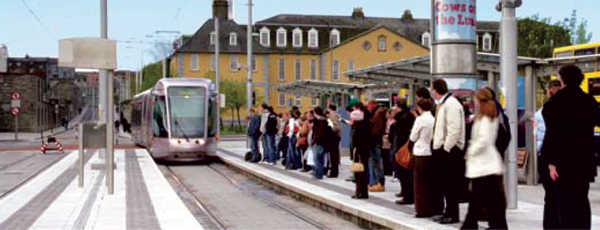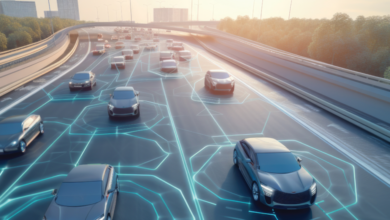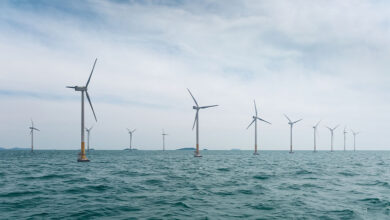Smarter travel
‘Smarter Travel – A Sustainable Transport Future’ 2009-2020 is the Government’s action plan to free Irish towns and cities from choking traffic congestion, reduce CO2 emissions and help car-based commuters to leave their cars at home.
“Cities are grinding to a halt with choking traffic congestion and that can’t continue”, was the warning of Transport Minister Noel Dempsey at the launch of Smarter Travel earlier this year along with Communications, Energy and Natural Resources Minister Eamon Ryan.
Minister Dempsey believes Smarter Travel “is not simply a series of transport initiatives. It represents a radical transformation in transport policy that puts people, rather than vehicles, first. It has the potential to fundamentally change how we travel.”
Minister Ryan agreed, adding that the policy “is the first step in changing how we move and how we live. Our current transport patterns are unsustainable and make travel costly, time consuming and stressful”.
Consultation
Smarter Travel came as a result of a consultation launched by the Government in February 2008. Over 480 submissions were received illustrating broad agreement with the Government’s vision to have a sustainable transport system by 2020, including a recognition that fiscal measures would have to be introduced to discourage people from using the car unnecessarily. Such measures have included basing the vehicle registration tax (VRT) and motor tax systems from July 2008 entirely on CO2 emissions with rates considerably varying between models on the basis of their emissions.
The policy outlines that “if we continue with present policies, congestion will get worse, transport emissions will continue to grow, economic competiveness will suffer and quality of life will decline”. It sets out measures so that by 2020 there will be thousands more people walking, cycling, using public transport and leaving their cars at home.
With the policy, the Government aims to change the transport mix in Ireland so that by 2020 work-related commuting by car will be reduced from the current 65 per cent to 45 per cent, meaning that between 500,000 and 600,000 commuters will be encouraged to take means of transport other than a car.
Targets
Sustainability is at the centre of Smarter Travel. By 2020 it aims to:
• Move over 500,000 potential car- based commuters to other more sustainable forms of transport;
• Reduce CO2 emissions by at least four million tonnes;
• Ensure that electric vehicles account for 10 per cent of all vehicles on Irish roads;
• Move over 150,000 people to work by bike;
• Create regional e-working centres to help cut commuting times;
• Create an all-island car sharing website; and
• Invest in more park-and-ride facilities on the outskirts of major cities.
This will require new ways of approaching many aspects of policy-making in Ireland. It affects how schools and school curricula will be planned, influences where residential areas and centres of employment will be developed in the future, and returns urban spaces to people rather than cars.
The 49 measures outlined in Smarter Travel can be grouped under four key themes:
• To reduce distances travelled by private car and encourage smarter travel, including focusing population and employment growth predominantly in larger urban areas;
• Ensuring that alternatives to the car are more widely available, mainly through a radically improved and more accessible public transport service and through investment in walking and cycling;
• Improving the fuel efficiency of motorised transport through improved fleet structure, energy efficient driving and alternative technologies; and
• Strengthening institutional arrangements to deliver targets.
Smarter Travel points out that the targets and actions are relevant to both urban and rural living. The Government says it is committed to rural regeneration and throughout the policy there are individual actions, such as improved bus services in rural areas, which reinforce this ambition.
“Pivotal to the policy” is the need to reduce travel demand. Actions to align employment and transport policies are set out, with a particular focus on encouraging e-working. Therefore the integration of existing and future business parks with public transport and their location within walking and cycling distance of residential areas is an important element of the policy.
The Government emphasises its commitment to supporting ‘mobility management’ programmes which encourage people to switch to more sustainable modes of travel. Smarter Travel aims to ensure that every school and college in Ireland has a travel plan to encourage students and parents to take alternatives to the car. As part of this programme, the Government will ensure that local authorities identify and implement safe walking and cycling routes to and from schools and other educational institutions as well providing better access for people with disabilities.
Where safe routes cannot be provided, an extension of the existing school transport scheme will be considered. The policy also signals the need to develop solutions to make the movement of goods more efficient. This includes ensuring that the Department of Transport deals with freight policy issues in a more integrated manner and prepares a specific policy for the freight sector. Another proposal is to organise a forum to bring all interested parties together, including industrial development agencies and industry representative bodies, to explore issues relating to the movement of goods in greater depth.
Smarter Travel states that “to ensure a reduction in travel demand and reliance on the car can be achieved, there must be appropriate, reliable and user-friendly alternatives in place”. These alternatives will include:
• Support for car-sharing initiatives;
• Fast tracking of park-and-ride facilities;
• Support for use of vehicles that do not rely on internal combustion engines i.e. electric vehicles and hydrogen powered vehicles and
• Making 10 per cent of car fleet electric by 2020.
Transport 21
Smarter Travel says that public transport needs to be provided for a further 90,000 commuting passengers, therefore its aim is to transform both rural and urban services to meet this challenge.
These extra public transport passengers are in addition to the 140,000 already provided for in the Transport 21 policy, which represents the largest investment in Ireland’s transport system to date. From 2006 to 2015 it will provide €34 billion to deliver an improved transport system with significant work underway, and planned for the future, which will transform Ireland’s national roads, rail and bus services, and regional airports through prioritising investment for efficient freight movements; roads schemes which provide environmental, social and economic benefits; and aviation and maritime transport facilities focused on better access to and from the island.
In addition, the Government hopes that around 200,000 people will switch to cycling and walking. It therefore aims to introduce “radical measures” to support these modes so that citizens can take these healthy options in safety. This will involve investing in new, safer cycling and walking routes, by delivering a National Cycle Policy Framework, and developing a National Walking Policy with provision of safe pedestrian routes linked − where appropriate − with public t
ransport services.
Smarter Travel details actions that can be taken to improve the efficiency of motorised transport to reduce emissions and reliance on fossil fuels. There is a commitment to making all publicly funded transport fleets more sustainable and to do this the Government will require every public sector organisation and public transport provider to prepare a plan for fleet replacement based on the most sustainable vehicle and fuel type.
In terms of air and sea transport the Government vows that it will “work positively with its EU partners to strengthen the treatment of aviation in the emissions trading system” as well as “engaging positively at international level to ensure that less polluting fuels, such as low-sulphur distillates, are used in maritime transport” to meet its obligation to achieve a target of having 10 per cent of all transport fuels from renewable sources by 2020.
The Government also commits to an ongoing programme to encourage and demand more efficient driving through training and adaptation of more environmentally friendly speed limits and through the use of technology to tackle road traffic congestion. These technologies could include incident management technologies on key roads to limit the development of traffic jams which result in higher fuel consumption and carbon emissions. The Government also wants efficient driving to become part of the driving test.
Integrated delivery
An integrated delivery of the policy is essential to its success. The issues cut right across all areas of government. The Department of Transport will drive delivery of individual actions. Existing transport agencies, such as the Dublin Transportation Agency, have an important role to play in delivering targets set out in the policy and their roles will be reviewed in light of it.
Local authorities will be required to prepare transport plans in keeping with Smarter Travel and ensure that local development plans are aligned to them. The potential for more all-island initiatives is outlined; good progress has been made on cross-border roads and rail projects, joint recognition of road penalties and in new pilot projects such as a car-sharing scheme proposal for the Derry/Donegal area. The Government says it will continue to work with the Northern Ireland Executive “to develop practical solutions to make travel on the island more sustainable, and in particular, to co- ordinate and integrate sustainable transport initiatives in both jurisdictions”.
Smarter Travel sets out support schemes for sustainable travel projects, including the concept of sustainable demonstration towns. Funding for these will be routed through local authorities and the Departments of Transport, Health and Children, and Environment, Heritage and Local Government will co-ordinate proposals. As part of this initiative the Government will explore, through the North/South Ministerial Council, possible linkages to any proposed scheme for Northern Ireland.
The Government estimates that the cost of implementing Smarter Travel will be approximately €4.5 billion. Funding will depend on the Government’s financial situation in light of prevailing economic and budgetary parameters.
Other key initiatives in the policy include:
• Future government investment in public facilities to give priority to walking, cycling and public transport as primary means of travel so they will rise from 35 per cent at present to
55 per cent of total commuter journeys to work by 2020;
• A focus on catering for future population and employment growth predominantly in sustainable urban areas and support for greater flexibility in work patterns and e- working;
• Redesign of urban bus services to achieve optimum use of the existing fleet and additional resources if necessary and scheduled bus services in significant centres of population, and for other areas, seven day a week access to public transport;
• The delivery of integrated ticketing;
• Ensuring the total kilometres travelled by the car fleet in 2020 will not increase significantly from current total car kilometres; and
• Reducing the 2005 figure of 13 megatonnes of greenhouse gas emissions from the transport sector by four to eight megatonnes by 2020.
Looking ahead to the long-term positive benefits of the Smarter Travel policy framework, Minister Dempsey said: “While changing travel behaviour will take time, these benefits, particularly the health, environmental and quality of life dividends, will accrue not only during the implementation phase of the proposals but also beyond 2020. We are setting out our clear policy decision to put people not cars at the centre of our transport planning and delivery in future.”






